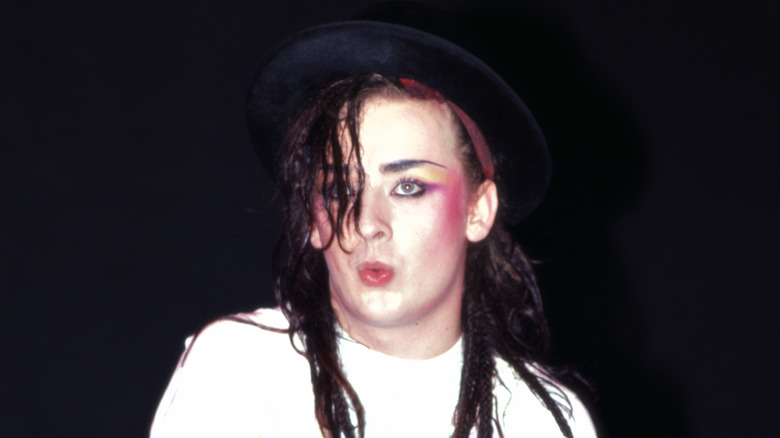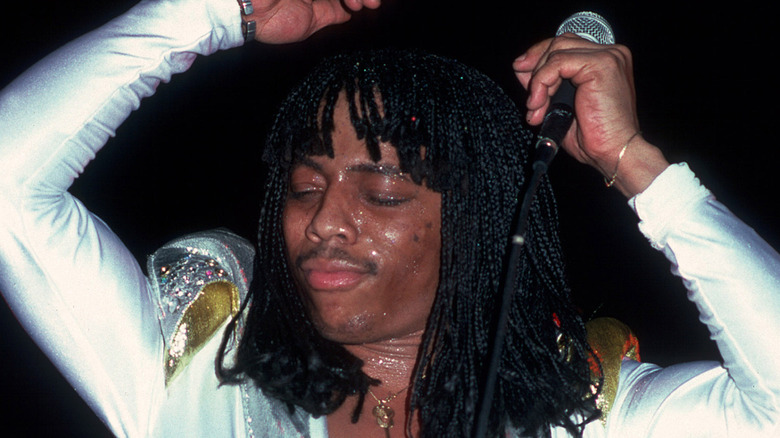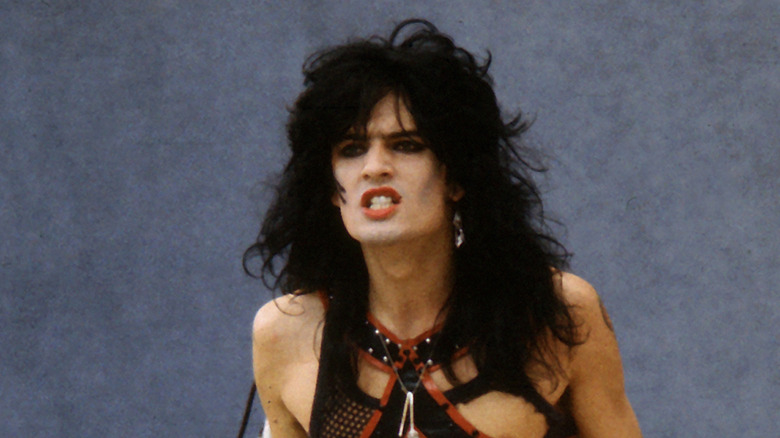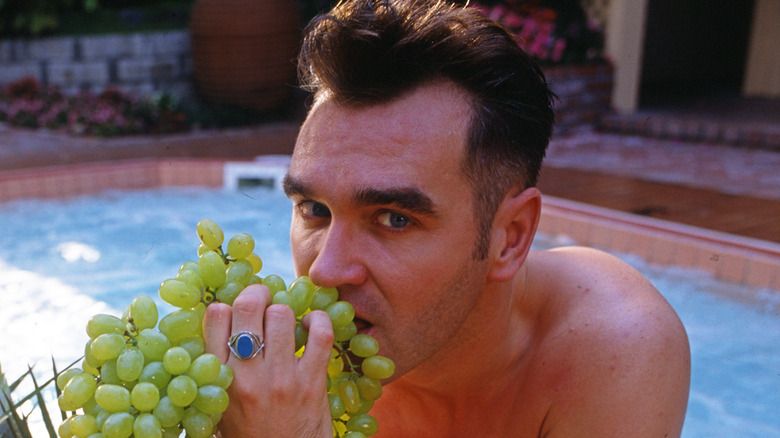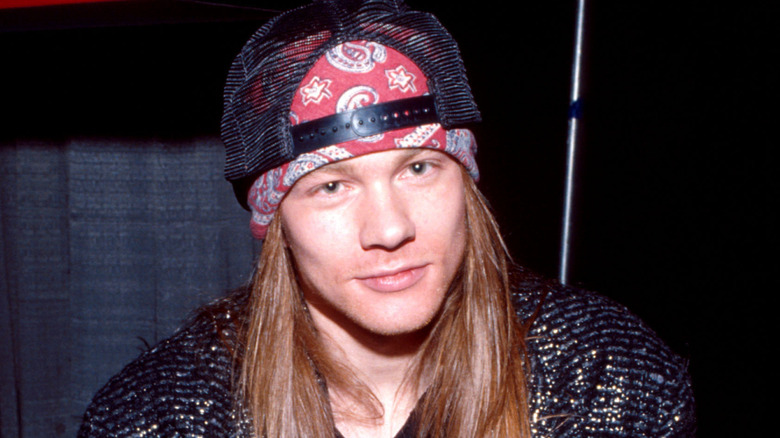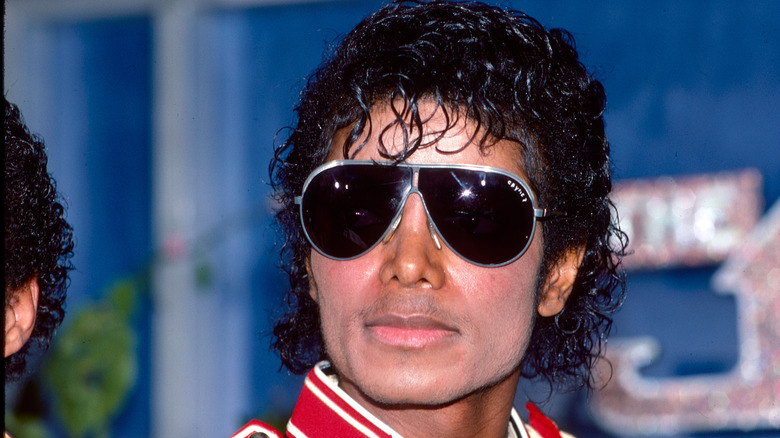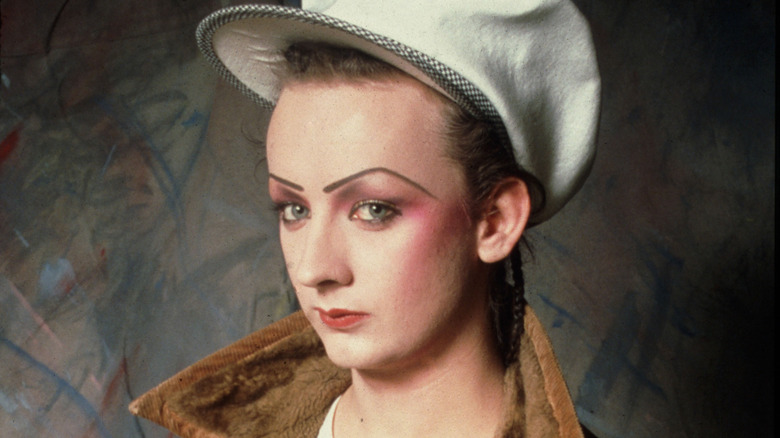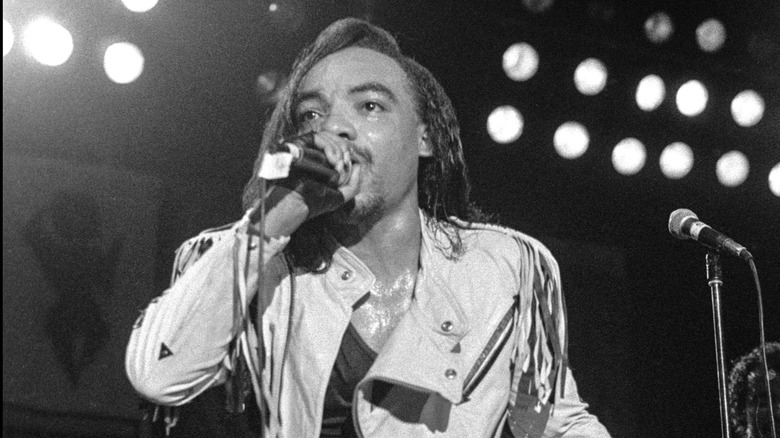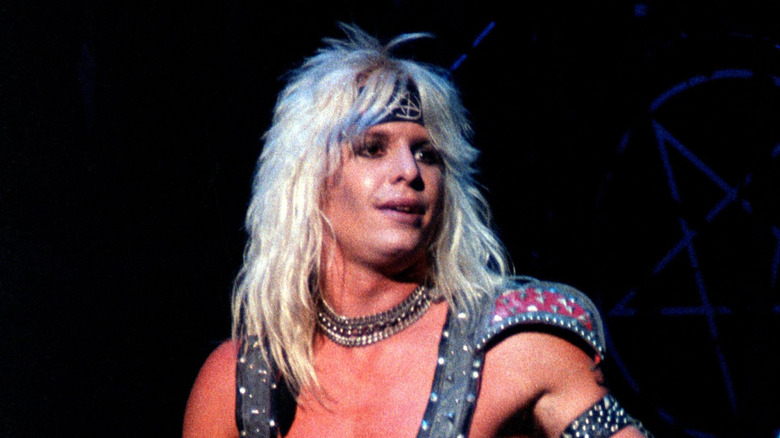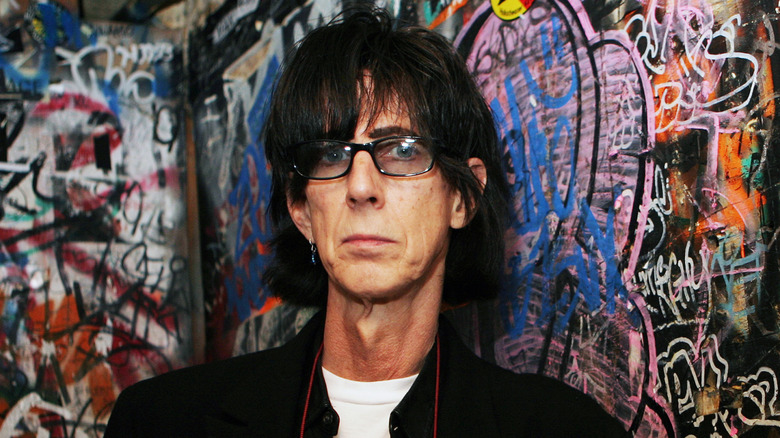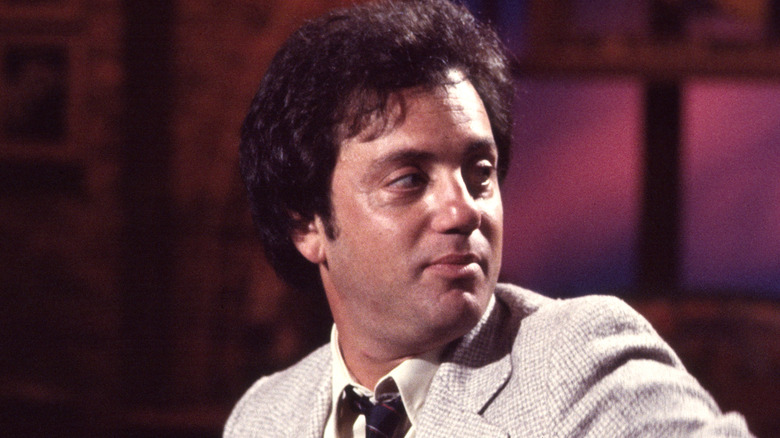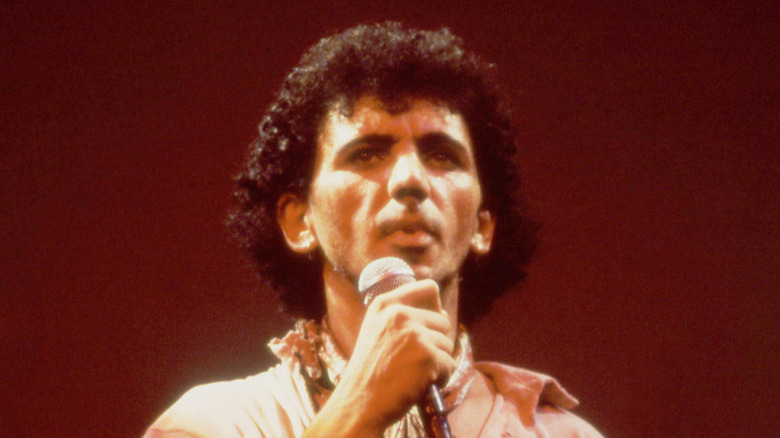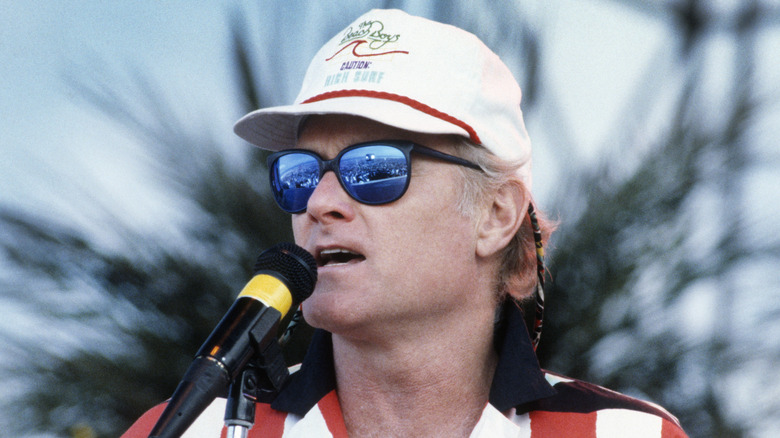'80s Musicians Who Were Actually Horrible People
There's probably never been a musical era more image conscious than the 1980s. It was very important for pop and rock stars to present themselves to the public in an agreeable fashion. The arrival of MTV and the rise of hair metal made musicians' appearances important, and old media and new media alike conspired to ensure that the artists cast themselves in a good light. No matter their genre, most every musician who pursued fame and fortune in the '80s had to make the world believe they were maybe a little bit dangerous but mostly harmless.
A great deal of musical acts associated with the 1980s veered more toward risky and destructive than squeaky-clean, however. Whether it was during the decade when they found their creative peaks and biggest successes, or long after those heady days had passed, some 1980s musicians let the facade break down and showed their true colors. Hiding behind that TV-ready, carefully crafted persona: some truly dark and troubling behavior.
Rick James
By the early 2000s, the hit-making era of funk superstar Rick James was largely forgotten by the musical mainstream. The man who once made classic party-starters like "Give It to Me Baby" and "Super Freak," was the subject of a surprising new appreciation when he was featured on the Comedy Central sketch series "Chappelle's Show." Memories from the crazy real-life story of Rick James, corroborated by show writer and friend Charlie Murphy, were dramatized in darkly comic fashion, and James came off as a violent, sexist monster addicted to drugs and fame. "Cocaine is a hell of drug," James quipped, a half-hearted explanation for his behavior. Just six months after the episode aired, James died.
After his epic chart run in the early 1980s, James did things far too dark and depraved to show on the sketch comedy series, which he said in his memoir were mostly triggered by heavy cocaine use and grief over the death of his mother. Then in August 1991, James was arrested on suspicion of assault with a deadly weapon, administering illegal drugs, and false imprisonment, among other things, for allegedly holding a woman against her will in his Hollywood Hills home. With his girlfriend participating, James reportedly tortured the woman, a stranger he met at a party, over the span of three days, forced her to smoke crack, and threatened to kill her.
Tommy Lee
Being rockers who partied way too hard was part of the identity and DNA of Mötley Crüe, a band as well known for its offstage debauchery as it was for its party-hearty 1980s hair metal hits like "Girls, Girls, Girls" and "Dr. Feelgood." Founding member and hard-hitting drummer Tommy Lee used to drink a startling amount of alcohol daily, and while that fueled his band activities, he got himself into plenty of trouble away from work. Lee's rap sheet of criminal activity stretches as far back as 1983, and in 1998 he earned a six-month prison sentence and three years of probation after being convicted of spousal abuse. He'd reportedly attacked his wife, Pamela Anderson, while she held their baby son, over a minor disagreement.
In 1999, Lee was charged with attempting to start a riot at a 1997 concert in North Carolina. After using offensive racial language directed at a Black security guard, Lee urged the audience to attack the individual. (Lee and bandmate Nikki Sixx also dumped a drink on the man's head.) A child drowned in Lee's swimming pool when he attended the drummer's son's birthday party in 2001, but the musician was found not liable in the subsequent lawsuit. In 2018, police were called to Lee's home, and Lee spent some time in the hospital, following a fist fight with his grown son.
Morrissey
As the lead singer and chief lyricist for the Smiths, Morrissey helped usher in the age of dour, dark, and moody English alternative rock with songs that exposed his pain and vulnerability. After the so-called "Pope of Mope" moved on from the Smiths to launch a fruitful solo career in the 1990s, Morrissey's words grew to be less about matters of the heart and into vitriolic statements that were widely interpreted as racist and xenophobic.
In 2007, the musician bemoaned how his home country was becoming too diverse. "Although I don't have anything against people from other countries, the higher the influx into England the more the British identity disappears," he told NME (via The Independent). "Travel to England and you have no idea where you are." Twelve years later, Morrissey performed on "The Tonight Show" wearing a button that indicated support of the For Britain party, whose policies have been called anti-Islamic. And in 2010, the vegetarian and staunchly pro-animal rights singer took the entire nation of China to task after he saw reports on mistreatment of circus and zoo creatures there. "Absolutely horrific. You can't help but feel that the Chinese are a subspecies," Morrissey told The Guardian.
Axl Rose
Guns N' Roses was just about the biggest rock band around in the late 1980s, after "Appetite for Destruction" became history's best-selling debut album. The shrieking vocals and aggressive charisma of lead singer Axl Rose helped sell the band, while the anger and frustration he often expressed on vinyl was apparently rooted in reality. During a 1991 concert outside St. Louis, Rose became so incensed when he saw a fan with a camera — forbidden at the show — that he forced his way into the crowd to confiscate it and then walked offstage for good. About 3,000 spectators rioted, causing $200,000 worth of property damage and injuries to 60 people. Rose was ultimately found guilty of assault and causing property damage, and he received two years of probation. Then in 1998, police arrested Rose at Phoenix's Sky Harbor Airport after the singer threatened to punch a security guard because he was worried the worker would damage an item in his luggage.
Rose also has a history of alleged crimes against women, both domestic and intimate. In 2023, Rose was sued by a model for an assault that allegedly occurred at a hotel room in 1989. And in 1994, Rose faced a suit from his former wife, Erin Everly, accusing him of emotional and physical abuse throughout their marriage. Both legal matters were resolved with settlements.
Michael Jackson
Two generational talents came together twice to collaborate in the early 1980s, and both times proved popular with the public. Former Beatle Paul McCartney teamed up with newly emergent superstar Michael Jackson, first to duet on "The Girl Is Mine," the first single from Jackson's 1982 album "Thriller," and then on "Say, Say, Say," from McCartney's "Pipes of Peace." Both songs reached the Top 2 of the pop chart.
Working together so closely naturally led to a friendship between McCartney and Jackson, with each being one of the few people on the planet who could relate to and understand the other's massive fame. In fact, Jackson asked for McCartney's help in determining what to do with the sudden and extremely large financial windfall that came his way when "Thriller" became the top-selling album of all time. McCartney offered a great suggestion: Invest his fortune in music publishing, or the rights to pre-existing recordings. Any time the songs he owned would be used in films or TV shows, or played or recorded again, Jackson would get paid. The King of Pop heeded the ex-Beatle's advice, and in 1985 Jackson spent $47 million to acquire the rights to most of McCartney's old band's catalog. McCartney had been attempting to buy back those songs himself, but Jackson offered then-controller ATV a bigger sum. The friendship never recovered from the slight.
Boy George
As much of a trendsetter for his groundbreaking and gender barrier-blurring fashions as he was for the sophisticated, melancholy pop he made with Culture Club, Boy George was an undeniable icon of the 1980s. Two decades later, he once again made headlines, but over an ugly criminal incident. In April 2007, the musician (real name: George O'Dowd) asked a model and sex worker named Auden Carlsen to accompany him to his flat. After sharing some cocaine and asking Carlsen to participate in an intimate photography session, O'Dowd went out to get cigarettes. When he came back, he quickly became viciously angry, believing that Carlsen had tried to make his way into O'Dowd's computer in order to steal photos.
At that point, Carlsen testified in court, O'Dowd violently struck him and handcuffed him to a wall. Then, after retrieving a box from another room, the musician used some of its contents, such as a chain, to beat him some more, even as Carlsen broke free and attempted to run out of the residence. In 2009, Boy George was convicted on a charge of false imprisonment and sentenced to 15 months in prison.
Kidd Creole
As one the first people to take rap music into the mainstream, Kidd Creole is among the most influential artists of hip-hop's golden age. The musician born Nathaniel Glover was a part of the Furious Five, the team of MCs who performed alongside Grandmaster Flash, maker and spinner of beats that were foundational to early 1980s rap hits. Kidd Creole's work can be heard on many first-wave rap singles with his collective, including "Freedom" and "Superrappin.'"
While on his way to his job on the night shift at a copy shop in Manhattan in 2017, Glover was approached by an unhoused man. An argument ensued, became violent, and ended when Glover used a steak knife to stab the stranger, 55-year-old John Jolly, in the chest. Glover then went to work and washed the knife. He was arrested and confessed to the fatal stabbing. In 2022, the rapper was sentenced to a 16-year prison term following a manslaughter conviction.
Vince Neil
Mötley Crüe's Vince Neil was perhaps the most iconic lead singer of all of the famous hair metal bands of the 1980s. In 1984, Mötley Crüe hosted a multi-day party in Redondo Beach, California, to celebrate the U.S. tour of Finnish rock band Hanoi Rocks. On the evening of December 8, an already drunk Neil decided to make a liquor store run and brought Hanoi Rocks drummer Nicholas "Razzle" Dingley along for the drive. While negotiating the twisty roads, Neil lost control and smashed into a Volkswagen. The two people in that car, Daniel Smithers and Lisa Hogan, were hospitalized, while Neil suffered only minor injuries. Authorities rushed Dingley to an area hospital, where doctors pronounced the 24-year-old drummer dead on arrival.
Neil faced substantial legal ramifications for bringing harm to two people and ending the life of another while driving under the influence of alcohol. Arrested the night of the accident, the musician registered a blood alcohol level of .17%, significantly exceeding California's then-legal intoxication threshold of .10%. Neil entered a guilty plea on charges of vehicular manslaughter and drunk driving. As part of a plea deal, he'd spend 30 days in jail and five years on probation, and complete 200 hours of community service. He also had to pay out $2.6 million in restitution settlements to Dingley's family, and to Smithers and Hogan.
Ric Ocasek
Part of the true story of the Cars is that co-frontman Ric Ocasek was pushing 30 years old when the group scored its first hit with "Just What I Needed." Apparently wanting to present himself as much younger, Ocasek's birth year was misreported as 1949. When he died in 2019, obituaries stated that Ocasek was 70, contradicted by public records that showed the rocker was born in 1944 and was thus 75.
Ocasek's death triggered the release of more personal information about the musician. Ocasek's first marriage ended in 1971, with the singer divorcing Constance Campbell while she was pregnant with the couple's second child, Adam. "My father, in essence, died the day I was born. He was never present, he was never there," older son Christopher Otcasek told Page Six. "I was living a few blocks from him for a year or two and saw him once maybe." Ocasek left his second wife, Suzanne, in 1988 after connecting with model Paulina Porizkova while making the Cars music video "Drive." That marriage ended in a separation that Porizkova announced in May 2018. Ocasek and Porizkova still lived together, with the model caring for the rock star until his death. When Ocasek's will was revealed, Porizkova learned that she'd been excluded. "I have made no provision for my wife Paulina Porizkova ('Paulina') as we are in the process of divorcing," Ocasek wrote (according to Page Six). "She has abandoned me." He also declined to leave anything to his two eldest sons.
Billy Joel
The piano-pop superstar of the 1980s, Billy Joel, made his first play at fame in the early 1970s with the progressive rock act Attila, a duo formed with his close friend Jon Small. In 1970, Joel met the first woman (of four, ultimately) that he'd marry. The romantic feelings with Elizabeth Weber were mutual, but for the relationship to continue, Weber would have to break things off with her husband, with whom she'd just had a baby: Jon Small. After Small learned of the indiscretion, Weber broke things off with both men, vanished for weeks, and then returned to Joel.
While he claims to have never officially been charged with any crimes of a vehicular or DUI nature, Joel has been behind the wheel during multiple frightening car accidents. While driving in East Hampton, New York, in the summer of 2002, Joel was involved in a single-car accident. About six months later, while motoring through Sag Harbor, Long Island, Joel ran his car into a tree, and he was rushed by air to a hospital where he received treatment for minor injuries to his head. Then in April 2004, Joel ran his car through some hedges and into a private home in Long Island, which somehow didn't injure anybody. In 2005, Joel entered into a substance abuse rehabilitation program.
Kevin Rowland
Dexys Midnight Runners was a one-hit wonder in the U.S., topping the charts in 1983 with "Come on Eileen," a quirky song that combined fiddles, banjos, traditional Irish music, and old-fashioned rock 'n' roll. The band had more staying power in the U.K., also landing in the upper echelon of the chart with "Geno," "There, There, My Dear," "Jackie Wilson Said," and "Because of You." By 1987, the hits had stopped coming, and Dexys Midnight Runners broke up. Band leader, singer, and main songwriter Kevin Rowland had blown through all the money he'd made with the group due to his cocaine use. Eviction from his home in London followed, as did a bankruptcy filing, as he was £180,000 in debt. He quit doing drugs after spending a period with a group he believes was a religious cult, and by decade's end he reconnected with the 17-year-old daughter he'd never met, having left the child's mother when she was pregnant.
In 1999, Rowland recorded music for the first time in more than a decade, a cover of Unit 4 + 2's 1965 hit "Concrete and Clay" — which the musician admits he thoroughly ripped off to get the chord sequence for "Come On Eileen" in the early '80s, a time period in which he did himself no favors by once physically assaulting a music journalist.
Mike Love
The Beach Boys had a massive comeback in 1988 with "Kokomo," a synthesized pop song that sounded nothing like what the band had previously made. Mike Love had largely taken control of the group, once led by Brian Wilson, and he almost systematically destroyed its legacy. When the Beach Boys were inducted into the Rock and Roll Hall of Fame in 1988, Love used his speech to make fun of the Beatles and the Rolling Stones. "The Beach Boys did about 180 performances last year," he said (via UCR). "I'd like to see the Mop Tops match that! I'd like to see Mick Jagger get out on this stage and do 'I Get Around' versus 'Jumpin' Jack Flash' any day now."
The band's creative opus was the 1966 LP "Pet Sounds," largely a manifestation of Wilson's ideas. At the time, Love hated the record; after "Pet Sounds" became a classic, Love tried to take credit for it. "People have said the same thing about 'Pet Sounds,' that I didn't like 'Pet Sounds.' That's a bunch of crap, because I went with Brian to play 'Pet Sounds' for the A&R guy at Capitol Records," Love told Rock Radio Online, adding that it was his idea to call it "Pet Sounds."
Then in 1992, Love sued Wilson for songwriting credits on old Beach Boys tunes. In 2005, he sued again because Wilson allegedly "shamelessly misappropriated" their band by bundling a Beach Boys album with a solo LP.
If you or anyone you know needs help with addiction issues or may be dealing with domestic abuse, contact the relevant resources below:
- The Substance Abuse and Mental Health Services Administration website or contact SAMHSA's National Helpline at 1-800-662-HELP (4357).
- The National Domestic Violence Hotline at 1−800−799−7233. You can also find more information, resources, and support at their website.
